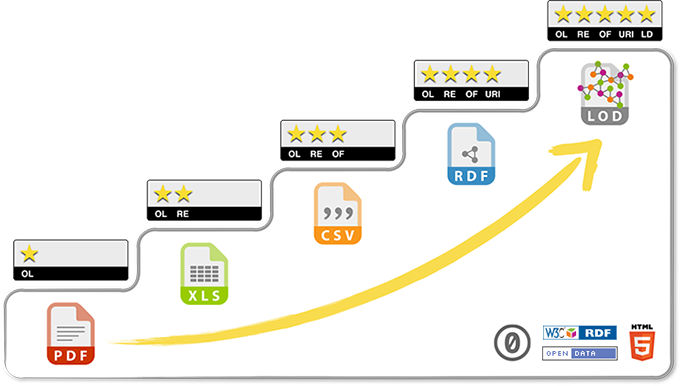Open as in free beer!
Open data and Open source licenses for developers.
Presentation by TheodorosPloumis / @theoploumis
Meetup No 28 - 18 Feb 2016 - TechMinistry.
Under Attribution 4.0 International license.
What is Open Data
- Available to everyone
- Free to use
- Free to republish
- Free to store
- No restrictions from copyright etc
- Free data are not necessary Open data
- Open data does not mean unlimited usage (resources)
The 5 star open data

License is the king
- It is the license the defines the open data.
- A Dataset (database) may have different license from its Content.
- Avoid Creative Commons license for Content.
- OKFN created the opendatacommons.org.
- ODI provides a certification for Open Data.
- CKAN and DKAN are the leader software for open data.
- DCAT is the RDF vocabulary to describe a Dataset.
Open Data Commons Open Database License (ODbL)
- Free to: Share/Create/Adapt
- As long as you: Attribute/Share Alike/Keep open
Open Data Commons Attribution License
- Free to: Share/Create/Adapt
- As long as you: Attribute
Open Data Commons Public Domain Dedication and License (PDDL)
- Free to: Share/Create/Adapt
- As long as you: -
Open Source licenses
- License refers to the code
- There is still a copyright holder
- You can make money by any means except from "Royalities"
- License is used to protect the owner from liability
- Prefer to assign the copyright to a company not a person
- Don't create your own license, prefer the popular and approved
- License says how to implement it
- Avoid the "No license", "Public Domain", "CC0"
Open Source licenses
- Richard Stallman pushed the first official license in 1985
- Does not apply to the trademarls or other marks
- We can run programs with different licenses side by side
- Brands and orgs create their (forked) license
- How to relicense an open source project
- Multilicensing causes trouble
- Sometimes there are CLA and CAA
- Using open source language does not mean open source project
Copyleft vs Non-copyleft
- Use non-Copyleft for libraries/functions that will be used in other software
- Copyleft: Forces to use the same license
- Non-copyleft: Not strict and focus only on attribution
- GPLv2 is the most popular copyleft license
- MIT is the most popular non-copyleft license
The licenses compatibility
 License compatibility between common FOSS software licenses according to David A. Wheeler (2007):
the vector arrows denote an one directional compatibility, therefore better compatibility
on the left side than on the right side. CC BY-SA 3.0 David A. Wheeler
License compatibility between common FOSS software licenses according to David A. Wheeler (2007):
the vector arrows denote an one directional compatibility, therefore better compatibility
on the left side than on the right side. CC BY-SA 3.0 David A. Wheeler
GPLv2 vs GPLv3
- OSI (v2) vs FSF + GNU (v3)
- No compatibility
- Projects under v2 (1991) can move to v3 (2007)
- v2 focus on the "give back to community" concept
- v3 focus on internationalization
- v3 focus on DRM free products
- v3 discourages patents and exclusive usage
- v3 blocks "tivoization"
- v3 is more strict
- ASF does not really agree with the FSF for GPLv3 compatibility